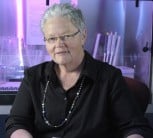Professor Riana Borman’s research seeks to understand the effects of endocrine-disrupting chemicals (EDCs) on human and environmental health, with a special focus on male reproduction. Most of her research is carried out in the rural areas of the Vhembe District in Limpopo, in communities where insecticide is sprayed to control malaria-carrying mosquitoes.
She began her career in the Department of Urology at the University of Pretoria (UP) in 1980 and had a research topic to explore within the first week, which triggered a career-long curiosity. “I am still researching the role of EDCs on human health today,” she says.
Prof Bornman, who obtained an MBChB at UP, says her research focus developed from her experiences in managing patients in clinical settings. “As a clinical physician, I realised that human and environmental health was intricately affected by environmental pollution, especially exposure to EDCs. Being a clinician at UP has created unique opportunities to conduct research in the Limpopo province.”
Her field of research addresses the unintentional health consequences of annual indoor residual spraying of insecticides to control malaria-carrying mosquitoes. In the Vhembe District, dichlorodiphenyltrichloroethane (DDT) is sprayed to control these mosquitoes and reduce cases of malaria and death. While DDT is largely a banned chemical, according to the Stockholm Convention on Persistent Organic Pollutants, it is allowed in some countries, including South Africa, for malaria vector control.
But there is growing concern around the adverse health effects associated with DDT. Scientific evidence from South Africa is crucial and contributes to the body of evidence that is calling for safer alternatives to DDT for malaria vector control.
The chemical is effective for about six months and needs to be sprayed every year. Prof Bornman’s research shows that annual spraying has negative, long-term consequences for pregnant women and young children. “We are seeing these consequences in children, possibly persisting into future generations, suggesting long-term health effects. Our research collects important irrefutable scientific evidence of the health impacts of EDCs in communities exposed to insecticides.”
Prof Bornman is the co-principal investigator for the Venda Health Examination of Mothers, Babies and the Environment (VHEMBE) study, which is being conducted in collaboration with Prof Brenda Eskenazi of the University of California, Berkeley in the US and Dr Jonathan Chevrier of McGill University, Canada. The VHEMBE study is the first birth cohort from a population that is currently exposed to DDT via annual spraying and is the biggest longitudinal birth cohort from Africa. The study group recruited and enrolled 752 mother-child pairs at Tshilidzini Hospital in Thohoyandou and have monitored the children up to eight and a half years of age for various possible health impacts.
She hopes to continue doing research that contributes to improving the health of those whose voices are not often heard.
She is also co-principal investigator and clinical leader of the South African Prostate Cancer Study, which is investigating the genomics of prostate cancer in African men; this is being done in partnership with Prof Vanessa Hayes, Scientific Director of the Garvan Institute of Medical Research in Sydney, Australia. A recent highlight in their research work has been funding awards from major international bodies to investigate the development of aggressive prostate cancer in black African men. “We are extremely motivated to continue with this research,” says Prof Bornman. “Successful awards reflect that the scientific leaders in our field support our approach.”
Over the past 18 months, the prostrate cancer study group began a new project that focuses on the mutational signatures of DDT and the possible role of this EDC on prostate cancer aetiology. Prof Bornman is also the study leader for a new study on knowledge, attitudes and practices of traditional healers, primary healthcare service providers and men in the rural Vhembe District.
She says in her research work she was inspired by Prof Dion du Plessis, former Head of Urology and Dean of the Faculty of Health Sciences at UP, who taught her to think beyond the obvious, to dream big and to just DO it!
Her academic role model was Prof Carl Franz, former Head of Surgery at UP. He was a prime example of how to integrate laboratory and clinical medicine in an academic career, she says.
Her message to school learners or undergraduates who are interested in her field is: “Every one of us, irrespective of our discipline, can make a difference in the lives of people. My research aims to improve the lives of people living with the constant threat of malaria under unforgiving environmental and socio-economic conditions. We can all do research that makes a difference. One just has to care enough about people.”
Her hobbies are photography and travel.
More from this Researcher

 Story
Story
 Infographic
Infographic
 Story
Story
Get Social With Us
Download the UP Mobile App